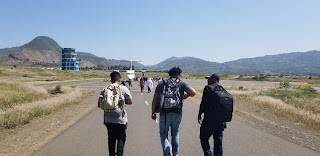Perfect timing
As of
this year, there are no more home visits. They were causing all sorts of
problems for the families we were going to see, including jealousy from
neighbors and increased rent from landlords who thought that since Americans
had come to visit, they had extra money. As wonderful as it was to go see
families in their homes, the last thing we wanted was to create additional
hardships.
In place
of home visits, Children's Hopechest created the concept of "Community
Day". On Community day, the parents come to the center so the team can
interact with them and get to know them so that their stories can be shared
with their sponsor families. I was asked to give a brief talk about parenting,
but since Kombolcha is predominately Muslim, and most of the parents are
Muslim, to avoid any overt Christian messages. I also felt it would be
presumptuous of me to suggest how to parent so tailored my message towards the
children about honoring them, and the sacrifices parents make on behalf of
their children. Myndi designed a craft that the kids could do with their
families which would give us an opportunity to mingle and learn more.
Everything was planned out and ready to go.
On our
ride to the care point, we stopped for fruit, as we normally do. While we were
waiting, we learned that the children would not be at the care point, that only
parents would be present. All of us looked at each other and started talking
through what we were going to do What was great was that everyone immediately
jumped in to rework the morning. I asked for suggestions on how to pivot my
message, and got some excellent ideas. We created an entirely new program in
the few minutes it took to drive from the fruit stand to the care point.
What we
didn't know is that CHDA already had their own plans for how the morning would
unfold, and I have to say that it was one of the most moving experiences I've
had After introductions, eight parents stood up and discussed their experiences
and history and why the care point was important for their child.
One
mother described how they'd had a really good family, albeit poor. But the
father developed mental issues and life got very difficult. She didn't describe
what happened (and purposely said that she wasn't going to discuss it), but
started crying when talking about how hard it was to raise children while
working. Having her child enrolled in the care point allowed her to receive
regular food supplements. She also said that education was very important to
her (although she is uneducated) and was grateful that her child, because of
sponsorship, had access to what he needed to go to school. She said she would
do anything for her children and has already made an untold number of
sacrifices to provide for then. Although weepy, her voice and facial
expressions exuded strength and perseverance.
A father
described the circumstances with his children. Several years ago, his son
passed away. Then, his wife left him, taking their daughter with her. He does
not know where she is and how to see her.
Another
mother described her husband as a gangster. Although he was no longer in their
lives, his reputation has made it very difficult for her to do simple things,
even the ability to rent a house because no one wants to rent to her. The
ability to have her son in the program allows her family to receive regular
food supplements, medical care, and access to education.
A
grandmother told us that when her daughter died, she took in her grandchildren.
She was not expecting to raise grandchildren at this stage in her life, but is
doing her best to provide for them on a very limited income.
Another
father told us how grateful he was for our visits and support. Our visits
illustrate to him that there are people who care for them, and knowing that is
very helpful during his struggles.
In all,
there were eight parents. Each spoke passionately about the sacrifices they
make for their children, how much they love their children, how they would do
anything for their children. It was incredibly moving. At least one of our team
was openly crying. Hearing their stories in such depth was much richer than
what we ever got on home visits. I appreciate Children's Hopechest for giving
us this opportunity.
After the
parents spoke, I gave my schpiel. I tried to relate my experiences as a parent
to the things I'd just heard, being careful to not give advice (who am to
presume I could do that for a culture I don't know enough about?).
Finally
three of the mothers showed their skills. Two of them showed us how to create
thread from cotton batten. Another mother showed us how to make a basket. (I
asked to buy the basket, which I will be bringing home. I'm not sure yet how
I'm going to fit it in my suitcase.)
Tomorrow
is another community day, this time at the other care point. We now know what
to expect. We'll see if there are any new surprises in store for us in the
morning...

Comments